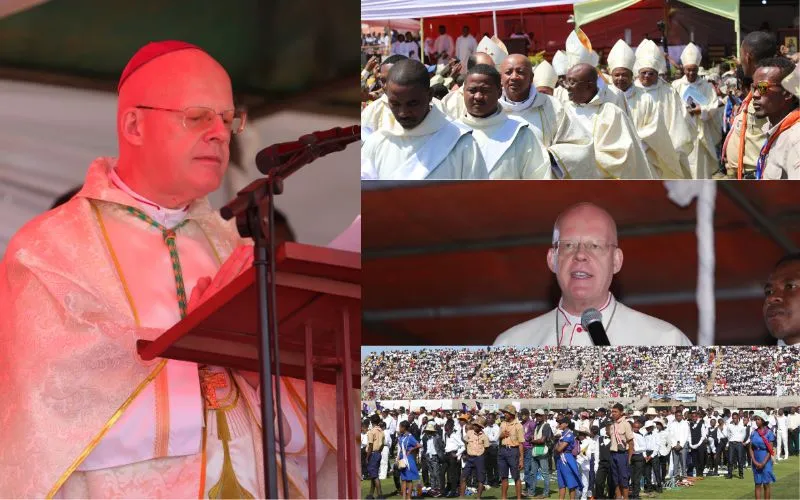The Vatican diplomat, who also represents the Holy Father in Mauritius, Comoros, and Seychelles warned, “Without reference to the Christian faith and the morality that flows from it, fraternity sometimes turns to the dark side, becoming a solidarity in evil, a brotherhood against someone, a corruption protected by common interests.”
“In contrast, the mystery of the Eucharist reminds us that we are all brothers! In this way, the Eucharist gives us the key to understanding the true meaning of fraternity. There's nothing so effective as fraternity for the future of peace and prosperity in Madagascar and throughout the world,” he said.
The Catholic Archbishop went on to highlight three fundamental gestures of the Eucharistic Congress, including gathering, journeying, and adoration.
“If it is true, as we believe, that Christ is truly present in the Eucharist, then it is quite simply the central event; not just the event of a single day, but that of the history of the world as a whole, as the decisive force from which transformations can then come. The important thing is that in the Eucharist, the Word and the Presence of the Lord in his Body and Blood are one,” he said.
Archbishop Grysa added, “If we want something to move forward in Madagascar, we can only do so on the basis of God's standard, which comes to us in the form of his real presence.”
(Story continues below)
“In the Eucharist, we can be shaped in such a way as to bring about something new. That's why the great figures who have accomplished genuine revolutions of the Good throughout history are not great warriors or powerful men; they are the saints who, touched by Christ, launched new impulses in the world,” he said.
“I pray that this ‘Eucharistic springtime’ will spread ever more widely in all parishes in Madagascar and throughout the world,” the Apostolic Nuncio implored.
He continued, “A Eucharistic spirituality is the real antidote to the individualism and selfishness that often characterize everyday life. It leads to a rediscovery of gratuitousness, of the centrality of relationships, starting with the family, with particular attention to soothing the wounds of those who are separated.”
A Eucharistic spirituality, Archbishop Grysa further said, “is the soul of an ecclesial community that overcomes divisions and differences, and values the diversity of charisms and ministries, placing them at the service of the Church's unity, vitality, and mission.”
“A Eucharistic spirituality is the way to restore dignity to human life, and therefore to human work, in the quest to reconcile it with festive and family times, and in the commitment to overcome the uncertainty of precarious work and the problem of unemployment,” he said.
A Eucharistic spirituality, the Vatican diplomat told ACI Africa, “will also help us to deal with the various forms of human fragility, aware that they do not undermine the value of the person, but require closeness, welcome, and help.”
Jude Atemanke is a Cameroonian journalist with a passion for Catholic Church communication. He holds a Bachelor’s Degree in Journalism and Mass Communication from the University of Buea in Cameroon. Currently, Jude serves as a journalist for ACI Africa.





